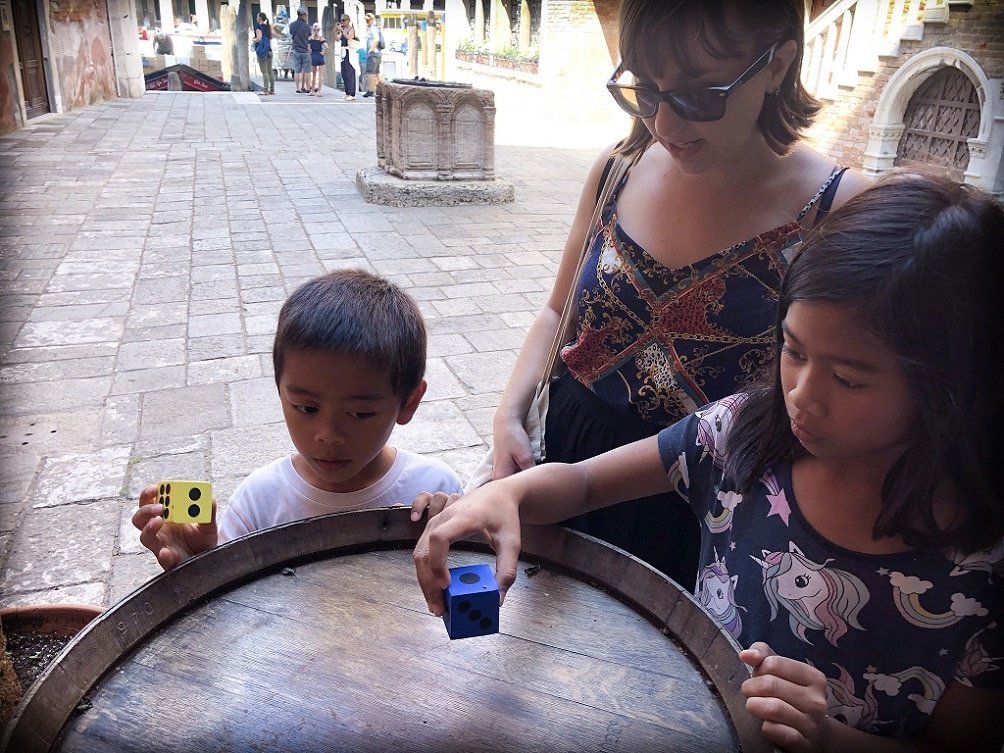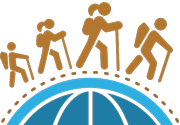Episode 4: What educational philosophies are best for worldschooling?

In this episode of Worldschooling Q&A, Astrid and Clint explore the question: What educational approaches align best with worldschooling? What are the best educational philosophies for worldschooling?
Worldschooling Q&A – Episode 4
Hosts: Astrid & Clint, creators of The Wandering Daughter
Title: Episode 4: What educational philosophies align best with worldschooling?
Episode summary
Astrid and Clint discuss how worldschooling, by its nature, is flexible and adaptable—making it a great complement to many educational philosophies, including experiential learning, holistic education, and unschooling. Drawing on their travels through places like Spain and Mexico, they share examples of how immersive experiences can be paired with books, videos, and family conversations to deepen learning.
They also dive into the child-led aspect of their travels, how their approach sometimes blended structure and spontaneity, and how worldschooling doesn’t require choosing just one method—it allows for a mix that evolves with your family.
How different educational philosophies shape your worldschooling journey
Worldschooling thrives because it adapts to each family’s approach to learning.
Whether your roots are in unschooling, holistic education, or experiential learning, these educational philosophies for worldschooling help shape how your family connects with the world.
Learning through experience
One of the most powerful educational philosophies for worldschooling is experiential learning. It’s about engaging all your senses to understand the world. When families take part in local workshops, visit historical sites, or simply observe daily life in a new culture, children gain lessons that go far beyond textbooks. Traveling through southern Spain, for example, we studied history not by reading about it, but by standing among the Roman ruins and Moorish architecture that told stories of centuries past.
The holistic approach to education
Holistic education values learning as a full, connected process. Families who lean toward this educational philosophy for worldschooling see every moment, whether reading together, watching a documentary, or reflecting on a shared experience, as part of a larger journey. It’s not just about knowledge but also empathy and connection. When kids learn how cultures intersect and evolve, they begin to understand the interconnectedness of our world.
Integrating learning into daily life
For many families, worldschooling means dissolving the line between “school time” and “life.” This mindset reflects one of the most flexible educational philosophies for worldschooling: lifelong learning.
Every activity can spark curiosity and teach something new. This can range from figuring out how to use local currency or going shopping at a local grocery story to cook a meal. Rather than separating academics from real life, families use the world as their classroom in the truest sense.
Flexibility in educational philosophies for worldschooling
While every family’s approach is unique, child-led and flexible learning stand at the heart of many educational philosophies for worldschooling.

Giving kids a voice in how they learn makes the experience more meaningful for everyone.
Creating family learning plans
When we arrive in a new place, our family makes a list of activities together. Each person chooses something they’re curious about, whether it’s visiting a local museum, learning a new skill, or exploring a nearby village. This shared planning reflects the educational philosophies for worldschooling that emphasize collaboration and autonomy. Kids are more engaged when they help decide what to learn, and parents discover new insights through their children’s questions.
Encouraging curiosity through familiarity
Sometimes revisiting destinations can help deepen learning. For instance, we often return to Mexico during our worldschooling trips, and that gives our children more context about the culture and geography of that country. That familiarity allows them to ask richer questions and make stronger connections. It’s a great reminder that educational philosophies for worldschooling don’t always require constant novelty. Sometimes the best lessons come from returning to a place with fresh eyes.
Embracing flexibility
Unlike traditional schooling, worldschooling requires flexibility. Plans shift due to travel logistics, local opportunities, or simple family needs. Many educational philosophies for worldschooling embrace this adaptability, viewing it as a life skill. Kids learn that schedules can change, but learning doesn’t stop, it simply takes a new form. Whether it’s a spontaneous market visit or an unplanned conversation with a local artisan, each detour offers lessons in resilience and creativity.
Educational philosophies for worldschooling through unschooling
Among all the educational philosophies for worldschooling, unschooling often draws the most interest. And it also often draws the most questions.

While not every worldschooling family identifies themselves as unschoolers, many borrow principles from this self-directed approach.
Learning through interest and play
Unschooling is based on the belief that curiosity drives true learning. Families who follow this educational philosophy for worldschooling give children the freedom to explore their interests, trusting that meaningful learning happens naturally. A child fascinated by local wildlife might spend days observing, sketching, and researching species, turning passion into knowledge without the need for formal lessons.
Trusting the learning process
Trust plays a central role in unschooling and in many educational philosophies for worldschooling. Parents act as facilitators rather than instructors, creating environments that nurture curiosity and confidence. This trust allows children to take ownership of their education and learn how to guide themselves. That skill will most certainly serve them long after the trip is over.
Balancing structure and freedom
Even in unschooling, balance matters. Some days might be unstructured, while others include planned activities or reading time. Families blend elements from multiple educational philosophies for worldschooling to find what feels right. There’s no single “correct” way to do it, only the approach that best supports your family’s learning rhythm.
The common thread: learning everywhere
Across all these perspectives, one truth remains constant: learning happens everywhere.

Educational philosophies for worldschooling invite families to stay open, to see value in small moments, to listen to children’s voices, and to find lessons in the unexpected.
Reflecting as a family
At the end of each day, our family likes to talk about what we’ve learned. Maybe it’s a new word in another language or an observation about how different cultures celebrate community. Reflection turns experiences into deeper understanding and helps children recognize how much they’ve grown.
Building lifelong learners
Ultimately, the goal of all of these educational philosophies for worldschooling is not to replicate traditional education, but to cultivate lifelong learners. As worldschooling parents, we want our kids to approach the world with curiosity, compassion, and respect. Whether you’re reading together, exploring a museum, or wandering through a local market, every travel experience becomes an opportunity for growth.
Submit your worldschooling questions here!
Episode guide
Flexible learning approaches
- Worldschooling can complement any of the educational philosophies out there—unschooling, Montessori, Waldorf, and more.
- It’s about tailoring education to your child’s needs and adapting as you go.
Experiential and holistic learning
- Learning happens through immersion—visiting ruins, tasting food, exploring architecture.
- Books, videos, and family discussions round out the experience.
Child-led travel and engagement
- Letting kids help choose activities keeps them curious and invested.
- Returning to familiar countries gives children deeper cultural context and autonomy.
Understanding unschooling
- Unschooling educational philosophies emphasize learning without a fixed curriculum.
- Astrid and Clint used a blend of curriculum and freedom—what they call “eclectic unschooling.”
Mindset over method
- Worldschooling is less about choosing a system and more about embracing flexibility.
- Even families in traditional schooling can take a worldschooling approach during travel gaps.
Chapters
00:00:00 – Introduction and welcome
00:01:08 – Today’s question: What educational philosophies align best with worldschooling?
00:01:26 – The role of experiential and sensory learning
00:02:27 – Holistic and immersive approaches to education
00:03:12 – Example: Learning about history in Southern Spain
00:05:18 – Books, videos, and conversations that build context
00:05:20 – Travel vs. worldschooling: who plans the learning?
00:05:49 – How child-led decision-making enhances engagement
00:06:56 – Creating trip plans collaboratively as a family
00:07:23 – Returning to familiar places: deeper child input
00:07:43 – Unschooling and how it connects with worldschooling
00:08:24 – Defining unschooling and its flexible nature
00:09:03 – A hybrid approach: curriculum + exploration
00:09:43 – “Eclectic unschooling” as a useful label
00:10:15 – Can worldschooling fit into any philosophy?
00:10:39 – Examples from Waldorf schooling and childcare backgrounds
00:11:25 – Encouragement for traditional school families to be flexible
00:12:13 – Kids returning from worldschooling are often ahead
00:12:35 – If you’re curious, start with mindset shifts
00:13:17 – Resources and articles on getting started
00:13:20 – Closing and how to stay connected

Further worldschooling resources
- 30 fun homeschool activities families can do anywhere
- 45 valuable worldschooling resources for families
- 11 helpful tips for becoming a worldschooling family
- 5 best homeschooling on the road tips for newbies
Support the podcast
- Join The Wandering Daughter on Patreon for episode transcripts, extra resources, and live office hours with Astrid and Clint.
- Follow and subscribe on Spotify, Apple Podcasts, and YouTube.
- Leave a five-star review to help others discover the podcast.
- Submit your worldschooling questions to our podcast page.





